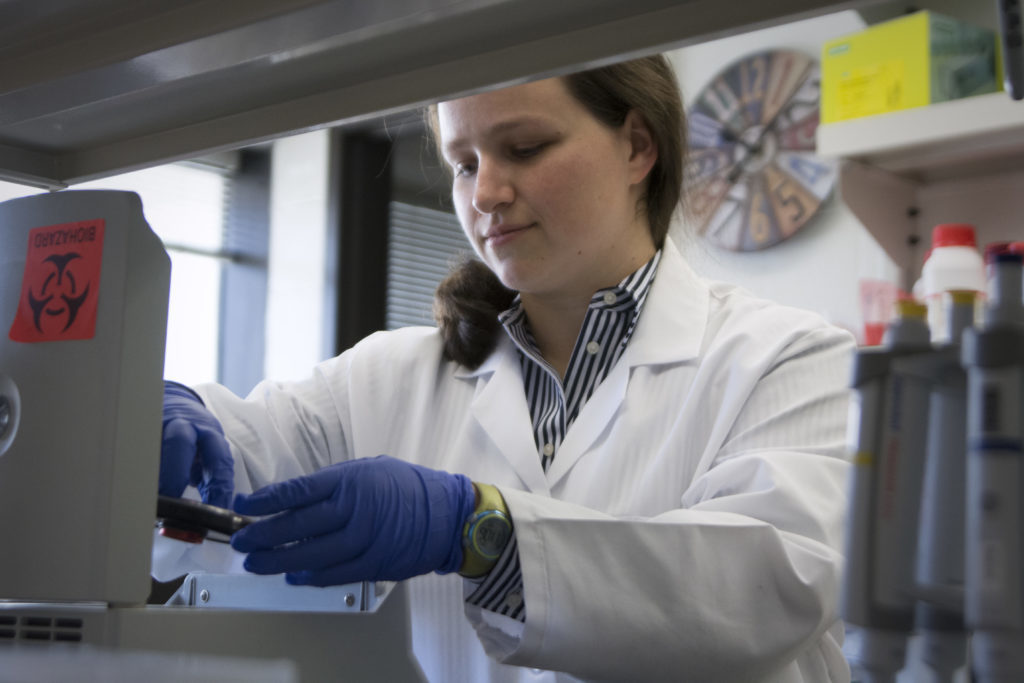An alumna’s research into orange plant oil may one day help treat veterans returning from war with post-traumatic stress disorder.
Cassandra Moshfegh, who graduated in the class of 2016 with a bachelor’s degree in biology, began investigating alternative treatments for PTSD in the summer of 2015 and found that orange essential plant oil, a concentrated liquid with the aroma of an orange, helps reduce anxiety in mice. She said her research has the potential to provide a simple, everyday treatment to what can be a debilitating disorder.
Her findings could lead to a new treatment for PTSD, a disorder that impacts 7.8 percent of Americans, according to The Nebraska Department of Veterans’ Affairs. PTSD is a condition of severe mental or emotional stress which can develop after an injury or psychological shock. Though commonly associated with veterans returning from combat, it can impact people who have experienced a wide range of traumatic events.
Moshfegh said she first learned about treating PTSD with different types of essential oils from a researcher in Japan. She said this researcher found that essential orange oil can decrease levels of anxiety.
“I was thinking there might be a change in gene expression if they were exposed to this oil and conditioned,” Moshfegh said.
Moshfegh had originally proposed researching the topic for the Luther Rice Fellowship, a scholarship that allows undergraduates in the Columbian College of Arts and Sciences to conduct their own research overseen by a professor, but her application was denied. She decided to still carry out her research on the subject.
For her own research, which is funded by the University, Moshfegh said she conditioned groups of mice with a stimulus that could cause anxiety — in this case, a mild tone with a “slight ring” through a speaker system. She said the mice were exposed to the essential orange oil before and after hearing the tone for 48 hours, and found that the mice’s stress was reduced after they inhaled the orange scent.
She said her research, which she conducts in a lab in Ross Hall, focused on the response of three different parts of the brain that are linked with condition learning and memory formation.
The mice were exposed to the essential orange oil by inhaling it passively – the oil was diluted with water, dipped in a cotton ball and hung in a tea infuser in the mouse’s cage.
“There’s other methods where you actually spray it into the mouse’s nose, or people have injected it from other reports that I read but I didn’t want to stress the mice out because that might affect my results,” she said.
She said essential orange oil is a good method of treatment because there are few adverse side effects unless the patient is allergic to oranges or their skin is easily irritated.
Moshfegh said she hopes her study will convince other scientists to be more open to researching alternative forms of medicine.
“I definitely wasn’t accepting when I first did the research myself,” she said. “I was kind of really blown away with the physiological changes and behavior changes I could see.”
She said she is still concluding her research and hopes to submit a final paper by the end of this month.
Moshfegh said she wanted to see other scientists replicate this study with other types of oil.
Moshfegh said while she did the majority of the research for the project, she collaborated with other researchers and professors in other labs, including Paul Marva, an assistant professor of pharmacology and physiology, who began working with Moshfegh in summer 2014.
Marvar said the PTSD research is reflective of the theme of his lab, which is to explore new and alternative therapies.
“I see that project in a way that, it is a project that contributes to the overall theme of the lab in terms of trying to identify new therapies for post-traumatic stress disorder,” Marvar said.
He said that alternative therapies for this disorder are important because there aren’t many treatment options for PTSD patients.
“Current therapies for PTSD are limited, and the number of individuals that are being diagnosed with post-traumatic stress disorder are on the rise,” he said. “So currently there’s a major push for coming up with novel and innovative ways to help improve symptoms of post-traumatic stress.”





